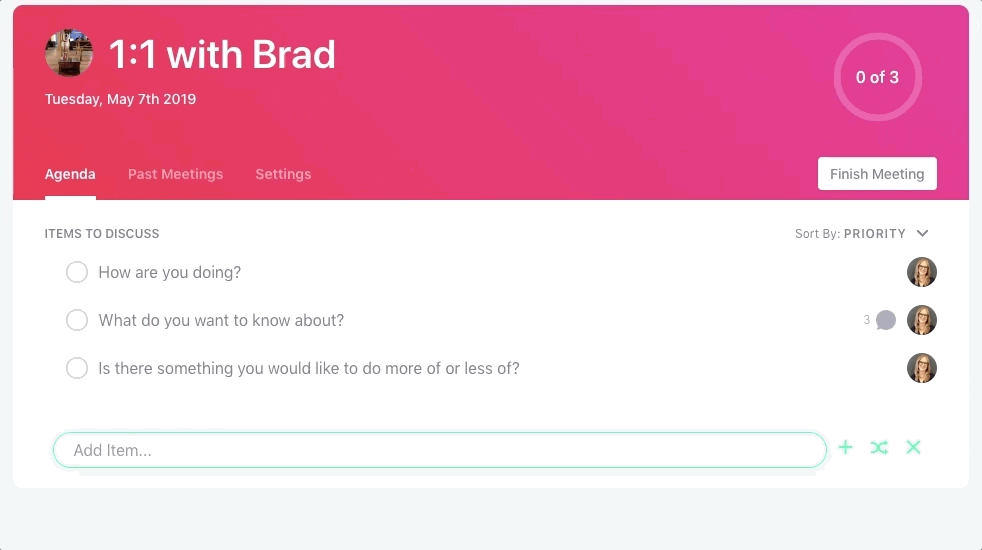10 questions your employees wish you’d ask in one-on-ones
We love talking about one-on-one questions to ask employees. Of course, in a perfect world, your employee would own your…
We love talking about one-on-one questions to ask employees.
Of course, in a perfect world, your employee would own your one-on-one meeting agenda. It’s their time, and ideally they’d fill the agenda up with everything that’s on their mind – that’s the purpose of one-on-one meetings, after all.
But some employees can be a bit cautious when it comes to bearing their soul on a one-on-one meeting agenda – and they need a little nudge to open up.
With that in mind, we polled a bunch of employees, and did some additional digging to learn what exactly your team desperately wishes you’d ask them about in your one-on-ones.
Here are 10 one-on-one questions to ask employees (trust us, they’ll thank you!).
1. “How’s life?”
This is one we highly recommend for both team meetings and one-on-ones because it helps to break the ice and also helps you to build relationships with your team. “Spending the time to learn about your employees beyond the office, fun things they are doing outside of work, how their kids or family are…taking five minutes to chat about things other than work is 👍,” said one employee.
Don’t overthink this one – but also, don’t let it go without a real answer. If you get a vague response, follow up with “OK…but really, how’s life?”
2. “Are you clear on my expectations?”
According to the Predictive Index People Management Study, the number one trait among bad managers (according to employees) is that they don’t communicate clear expectations. That’s why your team will appreciate this question: if they’re completely in the dark as to what your expectations are, they can say so. Or, it gives them a chance to clarify any irregularities or vague aspects of the expectations you’ve communicated in the past. Either way, they’ll appreciate you caring enough to check.
3. “Do you want a raise?”
OK, this probably isn’t something you’d want to throw on an agenda, but bringing up salary once in a while would mean the world to your employees. Yes – best practices dictate that the employee should be the one to initiate a compensation conversation, but they might not feel comfortable doing so. Starting the conversation now might empower the employee to feel able to bring it up in the future – and that might prevent you from losing a star performer because they didn’t feel comfortable asking for what they want. (Want to have a bigger discussion? Use our salary review meeting agenda template!)
4. “What’s something you want to learn?”
“I’m really focused on growth and getting to the next level in my career,” said one employee. “I love when managers are as engaged with my development as I am.”
It can sometimes be hard for employees to dive into a conversation about their career goals and growth, so a simple question like this one is a great way to get the ball rolling. Whatever their answer is, ask them why they want to learn that – this will start a bigger discussion around their growth, passions and plans for the future.
5. “What do you think we should do about _______”
This is all about showing your employees that you value their opinion. And not just through an employee engagement survey once a year.
Maybe it’s a project that has hit a roadblock. Maybe it’s a new company directive. Maybe it’s a challenge faced by an entirely different team. Asking them for their expertise will do wonders for their morale, and also encourage them to feel more ownership over the company’s success.
6. “What do you want to know about?”
Does your company pride itself on being super transparent? Great. Now, how do you really know if you’re succeeding at that or not?
Your employees definitely have things that they want to know that you haven’t thought to talk to them about. Maybe it’s, “Did Edward really quit, or was he fired?” Or maybe it’s, “What role does the board of directors play in setting company goals?” Even if you can’t provide the answer right then (or at all), your employee will appreciate the question, and will likely be more willing to ask for more context in the future.
7. “Do you have any feedback for me?”
Another insight from the Predictive Index People Management Study: one of the top ten traits of bad managers is that they aren’t open or interested in feedback.
This one-on-one question can be tricky, especially if it comes out of nowhere. You might not get a real response the first time you ask it. But if you keep adding this onto the agenda – and emphasizing that you truly want their feedback – your employees will eventually feel safe enough to give you a real answer.
8. “Is there something you would like to do more of or less of?”
This is one of those questions that can illuminate total blind spots in your management approach. You might think you’ve nailed your team’s strengths and weaknesses, but you might be dead wrong.
“Instead of blindly delegating tasks, jobs and projects to random people, talk to your employees about what is coming up and challenge them to step up and work on projects/tasks that they want to do,” said one employee. “People have different strengths and types of projects or work they would like to spend more time with to either learn more about or to utilize their existing skills.
9. “Do you need anything?”
Would a wireless mouse make their life easier? Are they sharing an Adobe login with four other people and it’s deterring them from finishing a project? Sometimes these little things never get dealt with because employees don’t know who to ask. As their manager, it’s your job to help them thrive in their role – so checking in how you can do that is important.
One word of warning: always follow up! Promising something to an employee and then completely forgetting about it can do more harm than not asking the question in the first place. Assign yourself a Next Step, and keep your employee updated on how their request is being processed.
10. “How do you feel about the project you’re working on?”
This is a great check-in to avoid a bunch of unpleasant surprises once a project is complete. Not only does it identify red flags that need to be addressed, it encourages your employees to reflect on the process and optimize as they go.
“I like getting asked how I feel about the work I’m doing,” said one employee. “What I like about it, what I don’t like, what I can change once I move on to the next project, what I am learning. I like being able to bring up struggles I had and concerns that came up.
BONUS: “Thank you for your hard work on ______!”
Not a question, we know. But recognition on a job well done is huge for motivating employees – especially if it’s something smaller that they might not realize you noticed. According to the Predictive Index People Management Study, one of the top ten traits of good managers, according to employees, is the ability to recognize when they do good work.
Want more one-on-one questions to ask employees? Get SoapBox! Our FREE one-on-one agenda tool includes suggested items to get the most out of your one-on-one meetings!
Have amazing one-on-one meetings in SoapBox
What should you do now
You made it to the end of this article! Here are some things you can do now:
- You should check out our YouTube channel for more tips on management skills and team building.
- You should try Hypercontext to see how it can help you run a high performing org.
- If you found this article helpful, please share it with others on Linkedin or X (Twitter)
In this post
In this post

